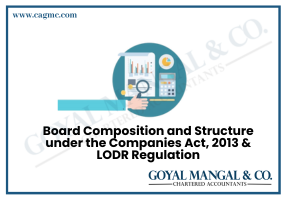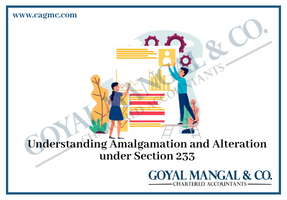
A dividend is often declared to investors in the form of cash distribution from the company’s earnings. Rather than reinvesting cash back into the firm, a company may choose to pay a dividend to its shareholders. Dividends are important for investors. They improve stock investing profits, provide an additional metric for fundamental analysis, lower portfolio risk, tax benefits, and maintain capital purchasing power. An interim dividend is one that is paid in the middle of a fiscal year. According to the Companies Act of 2013, the term dividend also includes interim dividends. Further, we will discuss more interim dividends and their declarations.
| Table of content |
What is the term Dividend mean?
A dividend is defined as a distribution of a company’s profits to its shareholders. It is in the form of cash or stock, as chosen by the company’s Board of Directors.
The Companies Act of 2013 defines a dividend as “the specific portion of the profit given to the shareholders from the net profit of the company”. Net profit is legally available in the company’s account for dividend distribution. A return on the share capital for reimbursement to a company’s shareholders is also known as a dividend. Also included is the interim dividend. The word “dividend” is derived from the Latin word “dividendum,” which means “to be split.”
What is an Interim Dividend?
A dividend refers to an interim dividend if it is earn by the board of directors during any financial year or at any time between the close of the financial year and the holding of the Annual General Meeting, as defined by subsection 3 of section 123 of the Companies Act, 2013 and relevant rules made under. The interim dividend can reward from any of the following sources:
- From a profit and loss account surplus.
- Or from the profits of the financial year in which the interim dividend is to distribute.
- From income earned throughout the fiscal year up to the quarter preceding the interim dividend announcement date.
Reason for the declaration of Interim Dividend
When a firm does well and makes a profit in the current financial year and wants to share those profits with its shareholders until the quarter preceding the date of interim dividend declaration, they do so through interim dividend. Also, profits from the current financial year can use to declare an interim dividend. If the corporation is losing money in the current fiscal year, the Rate of Dividends is the average dividends for the previous three years.
Companies pay dividends for a variety of reasons:
- Dividends allow corporations to share their earnings with shareholders, thanking them for their continued support and incentivizing them to keep holding the stock.
- Investors frequently consider consistent dividends to be an indication of a company’s strength. Also that management has high expectations for future profits growth.
- This makes the company more appealing to investors, resulting in a rise in the stock price.
What is the Procedure for declaring an Interim Dividend?
- The payment of the dividend is authorising according to the articles of the Private Limited Company.
- Issuing of Notice for holding meeting- The Company is necessary this by section 173 of the Companies Act. It is to give notice of the meeting of the board of directors of the company to discuss the matter.
- Holding of Board meeting: When holding meetings, the organisation must take into account the following factors:
- Determine whether the Company’s financial situation permits the payment of an interim dividend from profits available for distribution.
- Recommendation for dividend rate and amount
- Choosing a date for the record
- Pass a Board Resolution authorising the distribution of dividends.
- Pass a resolution authorising the private limited corporation to create a bank account in its name.
- Opening of account: Within five days of the dividend declaration, open a separate account in the name of the firm. Also, deposit the dividend payable in the prescribed account.
- Payment of Dividend: Dividends payable in cash is payable to the shareholder who qualify to receive them by warrant, check, or any other means.
- A corporation will not pay a dividend on any share until the registered shareholders of that share.
- The dividend should pay within 30 days after the date of the dividend proclamation.
In the event of a profitless period, how an interim dividend is declared?
The dividends will payout of the firm’s free reserves if profits are not available or are insufficient.
- The dividend rate will not be higher than the average of the dividend rates declared in the three years prior to the current year.
- The money is use to compensate for losses incurred throughout the fiscal year.
- The entire amount extracted from the accumulated earnings will not be more than one-tenth of the total paid-up share capitals.
- After the withdrawal, the reserve balance will not fall below 15% of the paid-up share capitals as shown in the most recent audited financial statement.
Penalties for failing to distribute dividends under section 127
If a corporation declares a dividend but fails to pay it or fails to deposit the warrant for it within thirty days after the date of the declaration to the shareholders, every director of the company is punishable. Accordingly, the corporation is punishable with 2 years of imprisonment and a fine not less than a thousand rupees. Also, The Corporation is necessary to pay simple interest at the rate of 18 percent per annum for as long as the delinquency persists.
There is no offense under section 127 of the Companies Act, in the following circumstances if:
- The dividend not paid due to the operation of any law;
- Dividend not paid due to the operation of any law;
- If there is a disagreement over who has the right to receive the payout,
- The company has legitimately adjusted the dividend against any cash owed to it from the shareholder.
- Or if the dividend not paid or the warrant not posted within the term was not due to any default on the firm’s part.
Conclusion
Declaring and distributing Interim Dividends to Shareholders will assist the company to acquire the trust of its shareholders and preserve a healthy relationship between the company and its shareholders. Also, before declaring an interim dividend, the board of directors must satisfy that the company’s financial situation permits the payment of such dividends out of its attribute profits. The interim dividend should declare if the company has achieved significant profits for a portion of the year and has good prospects for the remainder of the financial year.







